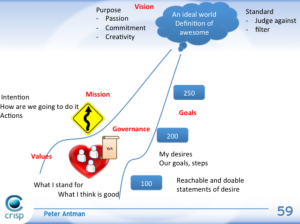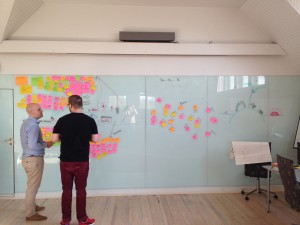The Pirate Ship is a workshop format that will help you grow amazing teams. It is “speed boat” on steroids. I have now been using it for a couple of years, and the time have come to share this useful and productive format.
I do a lot of workshops with teams. Very often the workshops are about the teams themselves. It can be anything from getting a newly started team up and running to helping a mature and stable team find new inspiration and challenges.
When I started with eXtreme Programing and agile practices more than a decade ago, I had no tools and no specific methods to handle teams and groups dynamic. I was missing a deeper understanding of what makes a team gell, what makes it a high performing team.
Over the years I have been involved with a lot of different teams in a lot of different situations (and I have read a book or two about team dynamics). I think I dare to say that I have come to understand more deeply what makes team work (although of course there are always more to learn and each situation is also unique). I have found the model developed by Starhawk (and several others) in her book The Empowerment Manual extremely helpful. Much of what I do today with teams have it’s roots in her so called Team Circle centering around Vision, Mission, Goals, Governance and Values.

I had exercises for all the different parts of the Team Circle, but I was missing a frame where all the pieces could fit together.
While working as an agile coach at Spotify 2014 I came up with a concept, or metaphor, that I thought would actually work: a pirate ship.
A ship is a great metaphor for a team. Being a crew that has to depend on each other and having a concrete common goal. Actually, this is really what was taking place both among pirates and, for example, on the ships of the medieval Hansa. As my favorite anarchist Peter Kropotkin wrote in his masterpiece Mutual aid:
“Thus, there was on board ship the naval authority of the captain; but, for the very success of the common enterprise, all men on board, rich and poor, masters and crew, captain and sailors, agreed to be equals in their mutual relations, to be simply men, bound to aid each other and to settle their possible disputes before judges elected by all of them.”
So, could the pirate ship be such a format and metaphor? I got the chance to test it on the management group of my tribe. Although I have to admit there were a couple of sceptics in the group I personally thought of it as a success.

Being able to tell a story about pirates, their mission, the flag and how they work together creates an immediate sense of what a team is. In my version there is also a visionary island where there are a group av people these pirates actually supports, by bringing gold to the inhabitants of the island. This is perhaps corny, but it normally works, if you are honest with your intentions and that you know that you are bending the metaphor.
I have since then used and enhanced this format both at Spotify and Expressen, where I am currently the Head of development.
Since I have found the format immensely useful I want to share it.
Here it is then: The Pirate Ship – Growing a great crew workshop facilitation guide.
Set sail.




Pirates might be a negative metaphore (unless you focus on the romantic side of piracy), you could go for privateers or buccaneers (https://en.wikipedia.org/wiki/Privateer).
I do like the parts of the crew, one captain, the flag, the mission, the base of support.
That fits better with privateers than with pirates.
Just an idea